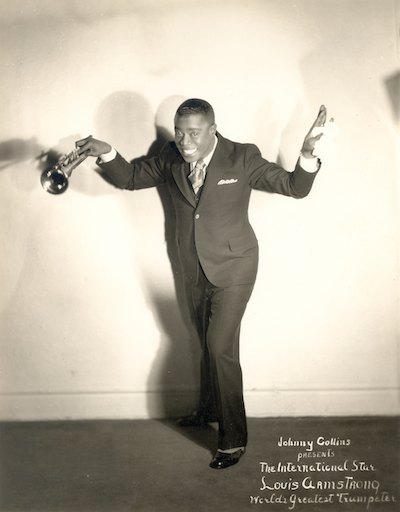I grew up believing that Louis Armstrong was born on the Fourth of July in the year 1900. I always thought it was appropriate for the great, American cultural hero to share his birthday with the nation. A big part of my enjoying Independence Day was always the fact that I’d hear Armstrong play classics like “Fireworks” and sing “St. Louis Blues” on the radio. When a researcher discovered that Armstrong was actually born a year-and-change later in August, 1901, the celebrations were hardly dimmed. In fact, New Orleans saw fit to offer homage to its native son with Satchmo Summerfest.

Young Satchmo, courtesy of the Louis Armstrong House.
OffBeat’s August issue is a special Satchmo Summerfest edition, dedicated to Armstrong. It’s one of the proudest achievements of my career. In addition to my cover story about Armstrong, there are several other stories about him, as well as an essay about one of his greatest albums, the Great Chicago Concert (written by Stereophile Music Editor, Robert Baird) and a top ten list of Armstrong’s greatest post- War II recordings compiled by myself. There’s also a fascinating story about Armstrong’s baseball team, the Secret Nine, by Ryan Whirty, and Zachary Young chronicles the profound influence trombonist Kid Ory had on a young Armstrong.
But the amazing thing to me is the way Armstrong’s content showed up for the issue unannounced, as if auditioning for its place in history. During an interview with Little Feat’s Paul Barrere, the guitarist revealed how central New Orleans was to his approach to music as well as the fact that Armstrong influenced his sense of rhythm and phrasing.
Then, while we were in the middle of putting the issue together, Uncle Lionel passed away. Even there, bridges to Armstrong emerged. In our composite obituary, Geraldine Wyckoff’s interview with Uncle Lionel detailed his fairly extensive connections to the Armstrong legacy. And Kid Merv, the trumpeter who will perform twice at Satchmo Summerfest — once with the Treme Brass Band and once with his own group — remembered his late mentor, Uncle Lionel, alongside Armstrong as two of his greatest influences.
Indeed, this year’s Satchmo Summerfest reveals a grace note to the celebrations of Uncle Lionel’s life, as many of its performers had strong ties to him and will, no doubt, mention him during their sets. In that spirit, I’ll close with an exchange I had with Treme music supervisor Blake Leyh about Uncle Lionel.
Blake, do you have any thoughts on Uncle Lionel? The musicians play themselves in Treme and I think the show really increased his visibility if that’s possible. Now he’s passed and I was wondering about your reaction.
“I still have a hard time believing it. I was sure Uncle was going to live to be 100 [years old]. I can’t quite believe that he’s gone. I knew he was sick, but it’s still really shocking. I’m very, very sorry that I can’t be in New Orleans tomorrow and Friday for the funeral. You know the story about my sister and Uncle Lionel’s drum?
“My sister Genevieve actually designed Uncle Lionel’s drum, the way it’s painted. She did that in the mid ’90s. My sister lived in New Orleans for about 10 years, and she knew Uncle Lionel well. He needed his drum redesigned and repainted, so she designed this painting with the logo of the curved word ‘Treme’ with a picture of a woman dancing with an umbrella and a little boy looking up her skirt.
“My sister painted that by hand and every few years he would need it redone. This was kind of like one of my claims to fame when I first came to New Orleans — my badge of credibility. [It was] Like I wasn’t just some Hollywood guy coming in to make a TV show. I’d say, ‘Well, you know my sister painted Uncle Lionel’s drum.’ I can’t tell you how far that got me. The crazy thing was that when I got the first script for Treme, it had the Treme logo on the front. I looked at it, and I thought ‘That looks so familiar; where is that from?’ Then I realized that they took the Treme logo from Uncle Lionel’s drum — from this hand-painted curved word ‘Treme’ that my sister designed. It’s one of these connections, one of those little paths of history and meaning that you find in New Orleans all the time because in New Orleans, everything is connected to everything else. I took Uncle Lionel’s passing very hard. He will really be missed. He was a completely unique individual. No one has ever been like him or will ever be like him again.”



